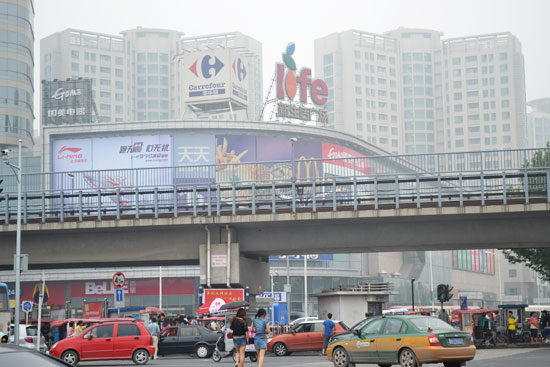
Carrefour in Tongzhou New City of Beijing July 2011.
The capital is to raise 10 billion yuan ($1.55 billion) during the next decade to tap the diverse potential of 42 underdeveloped suburban towns, according to the Beijing Municipal Commission of Development and Reform.
By the end of 2015, 5 billion yuan is expected to be in place, including 500 million yuan from the municipal government and the rest from the China Development Bank Capital Co, State-owned and private enterprises, social security funds and overseas capital.
The cooperation of public and private funds will highlight the advantages of combining government-sponsored undertakings and privately-financed projects, said Xiao Huili, director of the commission's township economics department.
As well as providing work and talent for the emerging towns, the investment will also provide new bases for industries that are no longer suitable for the city and ease the enormous population pressure facing the capital, Xiao said.
The money will be invested to build the 42 towns into convention venues, industrial parks, agricultural zones, service hubs and tourist destinations.
Some of the towns already attract travelers seeking to enjoy their beautiful scenery, but they have the capacity to develop tourism on a larger scale and generate considerable revenue, he said.
"At present, people usually go there and head back on the same day due to the poor accommodation conditions. If they can stay longer and spend a few nights, that will be a strong boost to the tourism economy in these towns," Xiao said.
Three towns have already been given the go-ahead by the municipal government, including Changgou township in Fangshan district, Weishanzhuang township in Daxing district and Lisui township in Shunyi district.
Xiao said the construction of hotels, transport facilities and a tourism service center will be the leading projects in Changgou township during the next few years.
Peng Fujun, a Changgou resident, said a five-star hotel was already under construction in the town and is optimistic that more people will visit Changgou if there are more tourist facilities, which in turn would create job opportunities for local residents. Many young people from Changgou now migrate to work in Beijing.
However, Yang Hongshan, vice-director of the Institute of Public Governance and Harmonious City at Renmin University of China in Beijing, cautioned that investment in public services should keep pace with economic expansion, and the government should give equal weight to economic efficiency and social fairness when making development plans.
"A convenient network of public facilities will make these emerging towns more palatable places to host green, low-carbon and modern industries and attract more tourists and talent," Yang said.